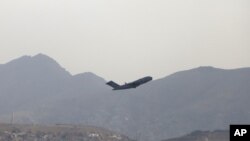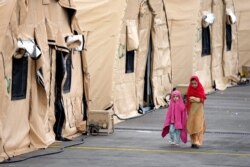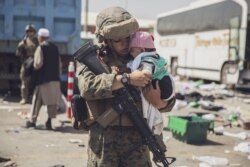The United States is promising it will continue to help evacuate Americans and vulnerable Afghans from Kabul up until “the very end,” despite ongoing threats to the airport, including an overnight rocket attack claimed by Islamic State’s Afghan branch.
Pentagon officials Monday said they had no intention of stopping what is being described as the largest airlift the U.S. military has ever conducted even with the approach of the August 31 deadline for the military withdrawal from Afghanistan now being measured not by days, but by hours.
“We continue to have the capability to evacuate and fly out those until the very end,” Army Maj. Gen. William "Hank" Taylor, the deputy director for regional operations for the Joint Chiefs of Staff, told reporters.
“The airport will remain operational through our final flights,” Pentagon press secretary John Kirby added, saying military planners “have worked out a very carefully coordinated method of safely completing this retrograde.”
The White House and Pentagon said that as of early Monday, a total of 116,700 people, including more than 5,000 Americans, have been evacuated following the Taliban’s takeover of Afghanistan earlier in August.
Officials said that included another 1,200 or so people flown out on 26 U.S. military flights and two coalition flights over the past 24 hours.
Officials also said there was no disruption to the most recent flights despite an overnight rocket attack on the airport.
Defense officials said as many as five rockets were fired at the airport.
Three of the rockets missed the airfield entirely while a fourth “landed with no effect to the mission or any danger to our personnel,” the Joint Staff’s Major General Taylor told reporters.
The fifth rocket was taken out by U.S. defense systems at the airport.
Islamic State-Khorasan claimed the attack on social media, adding that the rockets landed “direct hits,” according to a translation by the SITE Intelligence Group.
The veracity of the IS-Khorasan claim could not be independently confirmed, although the Pentagon described the threat from the terror group as “dynamic” and “fluid.”
“That's how ISIS-K operates,” the Pentagon’s John Kirby said, using an acronym for the terror group.
“We have to try to be as quick and as nimble as they are,” he said. “The threat stream is still real, it's still active and in many cases it's still specific.”
White House press secretary Jen Psaki said in a statement that President Joe Biden had been briefed on the attack and “reconfirmed his order that commanders redouble their efforts to prioritize doing whatever is necessary to protect our forces on the ground.”
But the U.S. is also coming under increased criticism for some of its security efforts, including a drone strike Sunday in Kabul.
U.S. military officials say the strike killed two IS-Khorasan operatives who were loading explosives into a vehicle with the intent of carrying out an attack on the airport.
But according to The New York Times, the strike or secondary explosions killed as many as nine civilians, among them children.
Kirby on Monday stood by the initial assessment of an imminent threat but added the military is “not in a position to dispute” accounts that bystanders, including children, were killed.
“No military on the face of the Earth works harder to avoid civilian casualties than the United States military, and nobody wants to see innocent life taken,” he said. “We take it very, very seriously.”
The U.S. is still reeling from Thursday’s suicide attack outside the airport that killed at least 169 Afghans and 13 U.S. service members.
Airlift winds down
As the U.S. deadline neared, U.N. High Commissioner for Refugees Filippo Grandi said Monday the Afghan people need governments, humanitarians and ordinary people “to stay with them and stay the course.”
“As people across the world welcome Afghans into their communities and homes, we cannot forget those who have been left behind,” Grandi said in a statement. “We must meet the critical humanitarian needs in Afghanistan and in countries around the region, and our response must be robust and urgent. Standing by the people of Afghanistan means standing by all of them, whether they have sought safety abroad or are picking up the pieces of their lives at home.”
As of Monday, the evacuation has airlifted about 122,000 people out of Kabul since the end of July, according to the White House.
“This is the most dangerous time in an already extraordinarily dangerous mission, these last couple of days,” Secretary of State Antony Blinken told ABC’s This Week on Sunday.
Republican U.S. Senator Ben Sasse, also on ABC, criticized the Biden administration’s evacuation operations.
“There is clearly no plan. There has been no plan. Their plan has basically been happy talk,” he said.
Blinken said in an interview on CNN that about 300 American citizens still are seeking evacuation from Afghanistan.
VOA White House correspondent Patsy Widakuswara and VOA Pentagon correspondent Carla Babb contributed to this report, which includes information from The Associated Press, AFP and Reuters.







